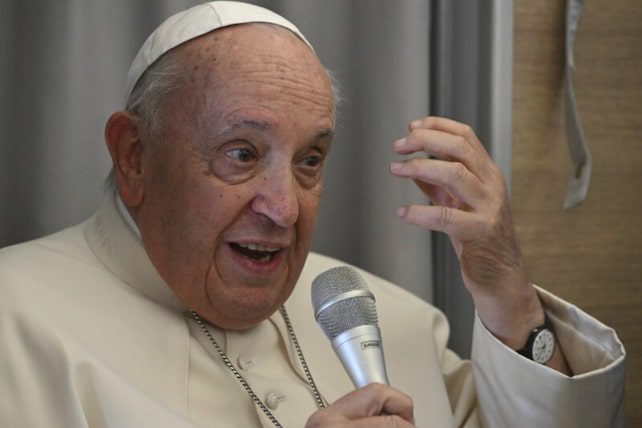ABOARD THE PAPAL PLANE (RNS) — Pope Francis praised the openness of the Chinese people and stated Russian culture must not be canceled because of politics during a news conference on Monday (Sept. 4) where he railed on the dangers of imperialism and ideology.
The pope’s comments were made while answering questions by journalists aboard the papal flight returning from Ulaanbaatar in Mongolia, where he paid homage to the small Catholic community in the majority Buddhist country. The four-day visit was sometimes overshadowed by the neighboring country of China, which banned local bishops from traveling to the event.
“Relations with China are very respectful. I have a great admiration for the Chinese people. They are very open, so to speak,” the pope said.
The Vatican recently renewed a provisional agreement with Beijing on the appointment of bishops, which has caused controversy among Catholics due to its secrecy and ambiguity. The United States and Europe have also urged the Vatican to take a firmer stand when negotiating deals with China. While Francis praised “the good work” done by the Sino-Vatican commission led by the Vatican secretary of state, Cardinal Pietro Parolin, China has often failed to respect the terms of the agreement and has recently imposed further restrictions on religious freedom in the country.
“We must go forward on the religious front so we can understand each other better,” Francis said. “The Chinese citizens must not think that the church is not accepting of their culture and their values or that the church represents another foreign power.”
During his trip to Mongolia, Pope Francis spoke to the Chinese people directly while addressing the current and former bishops of Hong Kong who were present. Small groups of Chinese Catholics clandestinely attended the papal events in Mongolia, given the unlikelihood of a pontiff ever setting foot in China in their lifetime.
The pope praised Mongolia for its ability to negotiate relations with its larger and powerful neighbors, China and Russia, stating that while some imperialistic forces have often sought to dominate, the Mongolian people have chosen to dialogue instead.
In May, the pope appointed Italian Cardinal Matteo Zuppi, an experienced peacemaker from the ranks of the Catholic lay movement of St. Egidio, to lead a peace mission to Kyiv, the United States, China and Moscow. While the pope has been a vocal advocate for peace in Ukraine, he has stopped short of openly condemning the invasion by Russia or its leader, Vladimir Putin, in the hopes of keeping open mediation channels.
Recent comments to a group of Russian students, in which Francis cited Peter the Great and Catherine the Great as part of Russia’s rich legacy, were interpreted by some as praising the country’s imperialist past, forcing the Vatican to issue a retraction. Francis told reporters aboard the plane that his intent was to encourage the young Russians to “take charge of their heritage” but admitted his examples might not have been appropriate. His remarks on Great Russia were, he said, more in reference to the culture than the politics.
“Russian culture is so beautiful, so immensely profound, and it must not be canceled because of political issues,” the pope said, citing the works of Dostoevsky. The transmission of culture “must never be imperial, never!”
“Always dialogue,” he added.
Francis denounced “imperialism that wishes to impose its ideology,” especially when it’s “removed from the culture. That is the poison.” This is true also for the church, he added, stating that “ideologies detach the church from its roots.”

